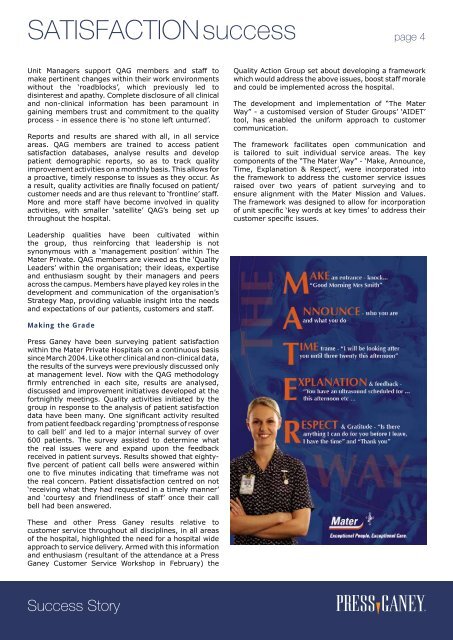Mater Private Hospital Brisbane, Queensland - Press Ganey Australia
Mater Private Hospital Brisbane, Queensland - Press Ganey Australia
Mater Private Hospital Brisbane, Queensland - Press Ganey Australia
Create successful ePaper yourself
Turn your PDF publications into a flip-book with our unique Google optimized e-Paper software.
SATISFACTION success<br />
Unit Managers support QAG members and staff to<br />
make pertinent changes within their work environments<br />
without the ‘roadblocks’, which previously led to<br />
disinterest and apathy. Complete disclosure of all clinical<br />
and non-clinical information has been paramount in<br />
gaining members trust and commitment to the quality<br />
process - in essence there is ‘no stone left unturned’.<br />
Reports and results are shared with all, in all service<br />
areas. QAG members are trained to access patient<br />
satisfaction databases, analyse results and develop<br />
patient demographic reports, so as to track quality<br />
improvement activities on a monthly basis. This allows for<br />
a proactive, timely response to issues as they occur. As<br />
a result, quality activities are finally focused on patient/<br />
customer needs and are thus relevant to ‘frontline’ staff.<br />
More and more staff have become involved in quality<br />
activities, with smaller ‘satellite’ QAG’s being set up<br />
throughout the hospital.<br />
Leadership qualities have been cultivated within<br />
the group, thus reinforcing that leadership is not<br />
synonymous with a ‘management position’ within The<br />
<strong>Mater</strong> <strong>Private</strong>. QAG members are viewed as the ‘Quality<br />
Leaders’ within the organisation; their ideas, expertise<br />
and enthusiasm sought by their managers and peers<br />
across the campus. Members have played key roles in the<br />
development and communication of the organisation’s<br />
Strategy Map, providing valuable insight into the needs<br />
and expectations of our patients, customers and staff.<br />
Making the Grade<br />
<strong>Press</strong> <strong>Ganey</strong> have been surveying patient satisfaction<br />
within the <strong>Mater</strong> <strong>Private</strong> <strong>Hospital</strong>s on a continuous basis<br />
since March 2004. Like other clinical and non-clinical data,<br />
the results of the surveys were previously discussed only<br />
at management level. Now with the QAG methodology<br />
firmly entrenched in each site, results are analysed,<br />
discussed and improvement initiatives developed at the<br />
fortnightly meetings. Quality activities initiated by the<br />
group in response to the analysis of patient satisfaction<br />
data have been many. One significant activity resulted<br />
from patient feedback regarding ‘promptness of response<br />
to call bell’ and led to a major internal survey of over<br />
600 patients. The survey assisted to determine what<br />
the real issues were and expand upon the feedback<br />
received in patient surveys. Results showed that eightyfive<br />
percent of patient call bells were answered within<br />
one to five minutes indicating that timeframe was not<br />
the real concern. Patient dissatisfaction centred on not<br />
‘receiving what they had requested in a timely manner’<br />
and ‘courtesy and friendliness of staff’ once their call<br />
bell had been answered.<br />
These and other <strong>Press</strong> <strong>Ganey</strong> results relative to<br />
customer service throughout all disciplines, in all areas<br />
of the hospital, highlighted the need for a hospital wide<br />
approach to service delivery. Armed with this information<br />
and enthusiasm (resultant of the attendance at a <strong>Press</strong><br />
<strong>Ganey</strong> Customer Service Workshop in February) the<br />
Success Story<br />
page 4<br />
Quality Action Group set about developing a framework<br />
which would address the above issues, boost staff morale<br />
and could be implemented across the hospital.<br />
The development and implementation of “The <strong>Mater</strong><br />
Way” - a customised version of Studer Groups’ ‘AIDET’<br />
tool, has enabled the uniform approach to customer<br />
communication.<br />
The framework facilitates open communication and<br />
is tailored to suit individual service areas. The key<br />
components of the “The <strong>Mater</strong> Way” - ‘Make, Announce,<br />
Time, Explanation & Respect’, were incorporated into<br />
the framework to address the customer service issues<br />
raised over two years of patient surveying and to<br />
ensure alignment with the <strong>Mater</strong> Mission and Values.<br />
The framework was designed to allow for incorporation<br />
of unit specific ‘key words at key times’ to address their<br />
customer specific issues.


